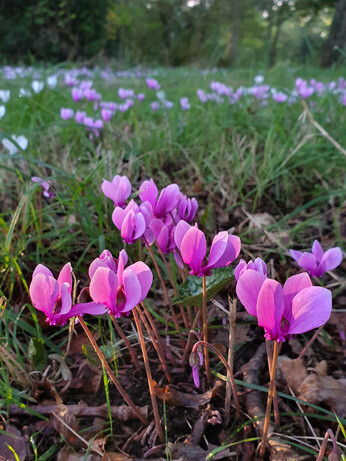Find out what the garden and propagation teams have been up to this week.

What's still in flower in October?
As the season continues to shift, all is not lost. A walk around the garden reveals a number of plants still happily flowering away in mid-October, injecting pops of colour helping to bridge the gap between summer’s abundant display and the imminent arrival of autumn’s intense shades.
Here's some of the plants still looking good:
Aconitum- (monkshood) prefers a rich and fertile soil, with reasonable moisture. If too dry, the foliage may shrivel, spoiling the overall effect. Best sited in some dappled shade to help with this and to grow amongst other plants, encouraging them to stay upright. Good autumn flowering, with colours ranging from deep purple, to slate grey. Common names such as wolf's bane and leopard's bane indicate a use in medicines and for poisons. Toxic, so always wear gloves when working with these plants.
Actaea matsumurae- (Japanese bugbane), for a cool shady place, not dry. Produces long stalked elegant leaves. In autumn, often well into October, November, relatively long spikes of fluffy, bottle-brush white flowers open from creamy buds.
Anemone x hybrida- (Japanese anemone)- a range of cultivars offer flowers in white, through to deep pink, single and doubles, from late summer into autumn. Generally grows with a spreading habit. Provides good presence in a shadier border, contrasting with ferns, hostas, etc. Some of the cultivated forms, which are still as good as any newly bred cultivars, originate from the mid-19th century.
Bistorta amplexicaulis- (syn. persicaria) bistorta is an old genus name, now back in use. Plants produce slender tapers of flowers ranging from white through to deep red. Happiest growing in a sunny or part shade position in a moisture retentive soil.
Cyclamen hederifolium- (ivy-leaved cyclamen)- the earliest and showiest cyclamen for naturalising under trees. Established tubers produce rose pink flowers in autumn followed by clusters of overlapping leaves, beautifully marbled silver on sombre green.
Erigeron annuus- (tall fleabane)- tall, short-lived perennial producing hundreds of small white daisies centred with a yellow eye, from early summer until late autumn. Will self-seed freely.
Glandularia ‘La France’- forms a low mound of much branched stems clothed in small deep green leaves setting off a constant display of light violet-blue flowers from early summer to autumn. For warm, well-drained soil in sun. Has stood recent winters outside but not reliably hardy, so take some autumn cuttings. Synonym Verbena 'La France'.
Oenothera lindheimeri- (gaura) flowers from midsummer through to autumn when there is nothing else like it. White flowers, pink flushed, float for weeks among graceful branches set with small, willow-like leaves. Needs full sun and well-drained soil. Synonym Gaura lindheimeri.
Symphyotrichum- the largest group of plants moved from aster, almost all from America. It contains the widely grown Michaelmas daisies, S. novi-belgii, (New York asters) and S. novae-angliae, (New England asters). From our experience these have smoother leaves, smaller flowers than aster. Many excellent cultivated forms available with a rainbow of colours and some with lovely contrasting dark stems. Good for late colour in the herbaceous border, generally in full sun.
Verbena bonariensis- (Argentinian vervain)- for sunny, well drained soils. Tall rigid, branching stems are topped with tight-packed flat clusters of small, mauve, scented flowers loved by butterflies. Standing high above surrounding plants, they make summer 'screens' to view the garden through from late summer to autumn. Don't cut down too soon to allow the plant to set seed. The mother plants can succumb to the winter and self-sown seedlings provide insurance. They are also as attractive out of flower, maintaining structure to the year’s end.
Read on- Planting in Autumn
![]()











I love taking a virtual walk around your site to discover what’s growing where, and to see if - should I buy something that catches my eye - I can find another, sometimes unexpected ‘right place’ for it. More often than not, I can. And while there are inevitably sacrifices along the way (RIP, Morinia longifolia!) the satisfaction when a plant takes to its new home with gusto is a thrill like no other. Thanks for providing so much inspiration over so many years!